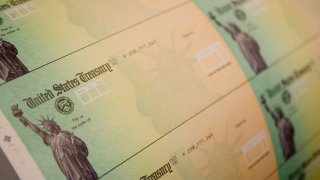
Scam artists are up to their old tricks, but with a new twist: exploiting confusion around the government's stimulus check program to defraud people to give up banking and personal information.
Fraudsters are phoning consumers and sending email and text-message phishing attempts impersonating government agencies, charities and businesses, demanding banking and personal information in order to deposit stimulus checks, according to warnings from the FBI, several states’ attorneys general and the Better Business Bureau.
The checks are yet to go out, but the Federal Trade Commission has already received 55 complaints about fraud and violation of do-not-call lists about the shady attempts, NBC News reported.
Coronavirus Pandemic Coverage
“Scammers are absolute opportunists and when they see something like a natural disaster or health care crisis, they pounce,” said Robyn Householder, president of the Better Business Bureau of Middle Tennessee. “Organizations like the IRS don’t call you, they don’t text you, they don’t send you email.”



